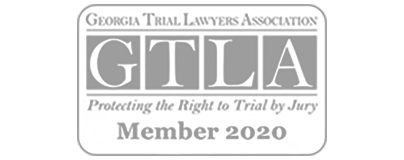Home | Glossary of Personal Injury Terms | Punitive Damages
Punitive Damages
When it comes to personal injury lawsuits, the primary aim of financial compensation is to restore the victim to their previous state, covering losses incurred due to the defendant’s actions. However, there exists a distinct category known as punitive damages, which serves a different purpose to penalize the defendant for egregious conduct. Georgia law clarifies when and how punitive damages are awarded. This article explores the nuances of punitive damages.
Punitive Damages vs. Compensatory Damages
In personal injury cases, damages are typically classified into two types — compensatory and punitive. Compensatory damages reimburse the victim for tangible losses—such as medical bills and lost wages—resulting from the defendant’s negligence. Conversely, punitive damages are awarded only in addition to compensatory damages and are not intended to replace them.
Statistically, while winning compensatory damages is more common, securing punitive damages is a rarer occurrence, contingent upon the specific circumstances of the case. Legal counsel can provide critical insights into the likelihood of obtaining punitive awards based on the details of your situation.
Common Scenarios for Punitive Awards
Some types of legal cases are more frequently associated with punitive compensation. These include, but are not limited to:
- DUI incidents
- Hit-and-run accidents
- Assault and battery cases
- Sexual assault claims
- Road rage incidents
- Dog bite cases
- Medical malpractice suits
- Product liability claims
It is essential to understand that the mere presence of negligence does not automatically qualify a case for punitive damages. Courts require proof of reckless or intentional misconduct, meaning that for actions like running a red light, punitive awards are unlikely, while driving under the influence may meet the threshold.
Legal Criteria for Pursuing Punitive Claims in Georgia
To successfully claim punitive damages in Georgia, the following legal elements must be established:
- Demonstrable Harm. The defendant’s actions must have caused physical or economic damage. While emotional distress may enhance the claim, punitive compensation cannot be sought solely for psychological harm.
- Active Misconduct. The defendant must have engaged in positive wrongful conduct rather than passive negligence. This means that the misconduct must be deliberate and not simply a failure to act.
- Outrageous Conduct. The defendant’s behavior must be sufficiently outrageous to be classified as reckless or intentional. Ordinary negligence does not suffice for punitive claims.
Standard of Proof
To successfully argue these elements, you must provide “clear and convincing” evidence. This standard of proof is notably more stringent than the “preponderance of the evidence” standard typically required for winning compensatory damages. It requires you to demonstrate that your claims are highly probable. However, it’s important to note that this is still not as rigorous as the “beyond a reasonable doubt” standard used in criminal cases, which emphasizes the civil nature of personal injury claims.
Steps to Pursue a Punitive Claim
In order to pursue a punitive damages claim effectively, you must take several key steps:
- Include a Demand in Your Lawsuit. Clearly state your intention to seek punitive damages in your initial complaint.
- Provide Justifying Facts. Present facts that, if proven true, would warrant a puntive award.
The process of proving punitive damages typically unfolds in two phases. The first stage focuses on whether you qualify. The second stage focuses on the appropriate amount to award.
Calculating Punitive Damages
When assessing the amount of punitive damages, courts consider various factors, including:
- The defendant’s historical behavior
- The likelihood of re-offending
- Any corrective measures taken by the defendant
- Ratio of punitive to compensatory damages
- The defendant’s financial capacity
No singular factor dictates the amount awarded, although the defendant’s financial ability can influence the final decision.
Pursuing a punitive claim in Georgia is a complex process that requires a thorough understanding of legal standards and a compelling presentation of evidence. By establishing the necessary elements and navigating the legal landscape effectively, you can seek justice for the personal injury you have endured, while also holding the responsible party accountable for their actions.
Legal Limitations in Georgia
In Georgia, punitive awards are tyypically limited at $250,000. However, there are notable exceptions to this rule which can significantly impact personal injury claims. Understanding these exceptions is crucial for anyone considering pursuing a punitive claim, as it can influence the overall outcome of a personal injury lawsuit.
- Product Liability Cases. Punitive damages are not restricted in cases involving product liability. Victims can seek punitive damages without a specified upper limit. However, it’s important to note that 25% of any punitive award must be allocated directly to the victim, with the remaining portion directed to the State of Georgia. The state designed this unique stipulation to balance the interests of both the injured party and the public good, reflecting its commitment to consumer protection.
- Intoxication-Related Incidents. Another significant exception occurs when the defendant’s actions leading to the accident stem from intoxication. This category includes any situation where the defendant’s impaired state contributed to harm. The rationale here is clear: if an individual chooses to engage in reckless behavior while under the influence, the consequences can be severe, warranting a stronger financial penalty.
- Intentional Harm. In scenarios where the defendant has demonstrated a clear intention to inflict harm upon the victim—such as in instances of assault or extreme acts of aggression like road rage—the courts are more willing to impose punitive damages. This exception underscores the legal system’s stance that intentional wrongdoing should be met with significant repercussions, beyond mere compensatory damages.
Even when one of these exceptions is applicable, Georgia courts traditionally impose a cap on punitive awards, limiting them to one order of magnitude above the amount of compensatory damages awarded. For instance, if a personal injury claim results in tens of thousands of dollars in compensatory damages, the punitive damages would typically not exceed hundreds of thousands of dollars. Claimants may recover attorneys’ fees if punitive damages are awarded under O.C.G.A. Section § 13-6-11. This can further bolster the financial relief available to victims pursuing justice for their injuries.
Tax Implications
When navigating the complex landscape of personal injury claims, it is crucial to understand the tax implications associated with the various types of damages awarded. The Internal Revenue Service (IRS) considers punitive damages, intended to punish wrongdoers and deter similar conduct, taxable income. This means that if an individual successfully claims punitive compensation as part of their personal injury claim, they will need to report these amounts on their tax return, ultimately impacting their overall tax liability.
In contrast, compensatory damages, which are awarded to compensate the injured party for actual losses suffered—such as medical expenses, lost wages, and pain and suffering—are generally not subject to federal income tax. The only exception to this rule involves post-judgment interest, which may be taxable. Interest accrues on the amount awarded in a personal injury claim from the time the judgment is made until it is paid. And, interest is treated as income for tax purposes.
Understanding these distinctions is essential for individuals pursuing personal injury claims, as it can significantly influence their financial outcomes. Claimants should consider consulting with a tax professional or legal advisor to navigate the nuances of their specific situations and ensure compliance with IRS regulations, particularly regarding how punitive damages might affect their tax obligations.

GEORGIA PERSONAL INJURY LAWYER NEAR ME
The Importance of Legal Representationm
Engaging a lawyer is highly advisable when seeking punitive damages. These claims can be complex and require adherence to specific legal procedures. Furthermore, defendants are often reluctant to agree to these damages during settlement discussions. Thus, legal intervention is essential.
If you have suffered an injury and believe another party is liable, pursuing compensatory damages is crucial. Additionally, consider the possibility of seeking punitive damages if your case meets the necessary criteria. Expert legal guidance can greatly enhance your chance of success.
In conclusion, punitive damages serve a vital role in the legal system by not only compensating victims but also by holding wrongdoers accountable for their actions. If you believe your case may warrant punitive damages, be sure to discuss this possibility with your legal counsel to fully understand your options.
GET A FREE CASE REVIEW
PRACTICE AREAS
AREAS WE SERVE
Frequently Asked Questions?
Do I need a personal injury attorney?
The Jewkes Firm is well-versed in effectively challenging major insurance companies on your behalf to secure the highest settlement permissible by law. Our primary objective is to ensure your optimal recovery. It is only after this point that we assess the worth of your case.
What is the deadline for filing an injury case in Georgia?
The timeframe for filing an injury case, also known as the statute of limitations, can vary significantly. As per OCGA §9-3-33, you are granted a two-year period from the date of your injuries or the passing of a family member to initiate your personal injury claim.
What is the cost to hire a personal injury attorney?
There is no upfront cost associated with hiring a personal injury lawyer. Our fees are based on a percentage of your settlement, meaning you only pay if we successfully recover compensation. Our top priority is ensuring your well-being and helping you return to your normal life.
What damages can you recover from a personal injury?
A personal injury lawyer aims to establish negligence and seek restitution for the harm caused by the liable party. Additionally, you may be entitled to compensation for funeral costs, medical expenses, and income lost if you are a family member of someone who died as a result of an injury.
Free Case Evaluation











